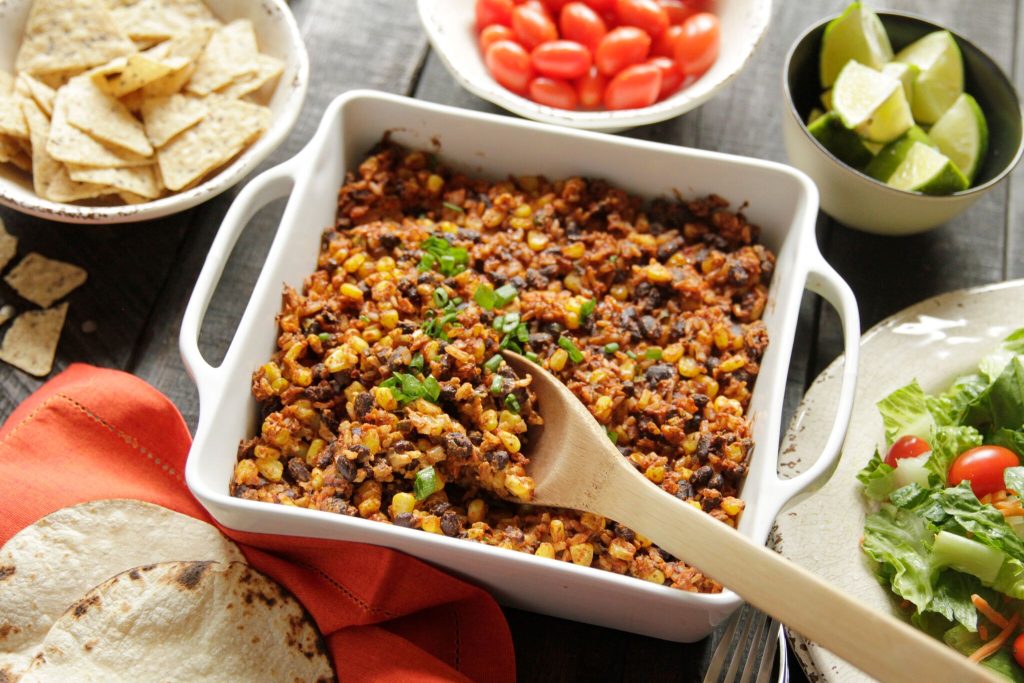Baked Black Beans: A Nutritious and Delicious Addition to Your Diet
In this article, we will delve into the savory world of baked black beans. From their nutritional benefits to various recipes and cooking methods, we’ll explore why these legumes are a must-have in any kitchen.
What are Baked Black Beans?
Baked black beans are a popular dish made from black beans that have been cooked slowly in the oven with a variety of seasonings and ingredients. This cooking method allows the flavors to meld together, resulting in a rich and hearty dish.
Why Are Baked Black Beans Important?
Baked black beans are not only delicious but also packed with nutrients. They are an excellent source of protein, fiber, and essential vitamins and minerals, making them a valuable addition to any diet. Additionally, they are versatile and can be incorporated into a wide range of dishes, from soups and stews to salads and dips.
Types and Categories
Varieties of Black Beans
- Traditional Black Beans: These are the classic black beans used in many recipes.
- Organic Black Beans: Grown without synthetic pesticides or fertilizers, organic black beans offer a more natural option.
- Canned Black Beans: Convenient and ready to use, canned black beans are a time-saving alternative to dried beans.
Symptoms and Signs
Benefits of Consuming Baked Black Beans
- Improved Digestive Health: The high fiber content in black beans promotes healthy digestion and can help prevent constipation.
- Heart Health: Black beans are rich in antioxidants and fiber, which can lower cholesterol levels and reduce the risk of heart disease.
- Weight Management: Due to their high fiber and protein content, black beans can help you feel fuller for longer, aiding in weight management.
- Blood Sugar Control: The complex carbohydrates in black beans help stabilize blood sugar levels, making them a suitable choice for individuals with diabetes.
Causes and Risk Factors
Factors That Can Impact Black Bean Quality
- Storage Conditions: Improper storage can lead to spoilage or loss of flavor.
- Cooking Method: Overcooking black beans can result in mushy texture, while undercooking can lead to tough beans.
- Seasoning: The choice of seasonings can greatly influence the flavor of baked black beans.
Diagnosis and Tests
Assessing Black Bean Quality
- Visual Inspection: Look for beans that are uniform in size and color, with no signs of mold or insect damage.
- Texture Test: Squeeze a few beans between your fingers to check for tenderness.
- Taste Test: Sample a cooked bean to assess its flavor and texture.
Treatment Options
Cooking Methods for Baked Black Beans
- Traditional Oven Baking: Slow-cook black beans in the oven with onions, garlic, and spices for a robust flavor.
- Slow Cooker: Set it and forget it! Let your slow cooker do the work while you go about your day.
- Pressure Cooking: Reduce cooking time with a pressure cooker while still achieving tender, flavorful beans.
Preventive Measures
Tips for Preserving Black Bean Freshness
- Proper Storage: Store dried black beans in an airtight container in a cool, dry place.
- Use Fresh Ingredients: Use fresh herbs, spices, and aromatics to enhance the flavor of baked black beans.
- Avoid Overcooking: Keep an eye on your beans to prevent them from becoming mushy.
Personal Stories or Case Studies
Real-Life Experiences with Baked Black Beans
“I used to think black beans were bland until I tried baking them with a mix of spices and veggies. Now, they’re a staple in my weekly meal prep!” – Sarah, avid home cook
“As someone with a busy schedule, I appreciate how easy it is to make a big batch of baked black beans and use them throughout the week in various dishes.” – Mike, working professional
Expert Insights
Advice from Nutritionists
“Baked black beans are a powerhouse of nutrition, providing a good balance of protein, fiber, and carbohydrates. Incorporating them into your diet can support overall health and well-being.” – Dr. Emily Nguyen, Registered Dietitian
“When preparing baked black beans, focus on using whole, minimally processed ingredients to maximize their nutritional benefits. Experiment with different herbs and spices to find flavor combinations you enjoy.” – Chef Michael Johnson, Culinary Nutritionist
Conclusion
In conclusion, baked black beans are a versatile and nutritious addition to any diet. Whether you’re looking to boost your protein intake, improve your digestive health, or simply add more flavor to your meals, baked black beans are an excellent choice. Experiment with different recipes and cooking methods to find the perfect dish for your taste buds.
Vegetarian Baked Black Beans: A Healthy and Flavorful Dish
Welcome to the world of vegetarian cuisine, where healthy meets delicious! In this article, we’ll delve into the delectable realm of vegetarian baked black beans. Whether you’re a seasoned vegetarian or simply looking to incorporate more plant-based meals into your diet, this dish is sure to tantalize your taste buds. Let’s explore why vegetarian baked black beans are not only a culinary delight but also a nutritious choice for any mealtime.
What are Vegetarian Baked Black Beans?
Vegetarian baked black beans are a hearty and wholesome dish made from black beans that are slow-cooked to perfection with a variety of flavorful ingredients. This savory dish is often enjoyed as a main course or served as a satisfying side dish. With its rich blend of spices and robust flavors, vegetarian baked black beans are a favorite among food enthusiasts worldwide.
Health Benefits of Black Beans
Before we delve into the recipe for vegetarian baked black beans, let’s take a moment to explore the numerous health benefits that black beans offer.
Nutrient-Rich Powerhouses
Black beans are packed with essential nutrients, including protein, fiber, folate, and iron. These nutrient-rich legumes provide a hearty dose of plant-based goodness, making them a valuable addition to any diet.
Heart Health
The high fiber content in black beans can help lower cholesterol levels and promote heart health. Additionally, the potassium found in black beans helps regulate blood pressure, reducing the risk of cardiovascular disease.
Weight Management
Due to their high fiber and protein content, black beans can help promote feelings of fullness and satiety, making them a valuable ally in weight management and healthy eating.
Blood Sugar Control
The complex carbohydrates in black beans are digested slowly, resulting in gradual spikes in blood sugar levels. This makes black beans an excellent choice for individuals looking to manage blood sugar levels and prevent diabetes.
Types and Categories of Vegetarian Baked Black Beans
Vegetarian baked black beans come in various forms, each with its own unique twist on this classic dish. Let’s explore some popular variations:
Traditional Style
The traditional style of vegetarian baked black beans typically includes black beans slow-cooked with onions, garlic, bell peppers, and a blend of savory spices.
Tex-Mex Style
Tex-Mex style vegetarian baked black beans incorporate ingredients like diced tomatoes, green chilies, cumin, and chili powder for a zesty flavor profile reminiscent of Southwestern cuisine.
Mediterranean Style
Mediterranean-style vegetarian baked black beans feature ingredients such as sun-dried tomatoes, olives, feta cheese, and Mediterranean herbs for a taste of the Mediterranean coast.
Spicy Chipotle Style
For those who enjoy a bit of heat, spicy chipotle-style vegetarian baked black beans are the perfect choice. These beans are infused with smoky chipotle peppers, adobo sauce, and spicy seasonings for a bold and fiery flavor experience.
Sweet and Smoky Style
Sweet and smoky-style vegetarian baked black beans combine the rich sweetness of molasses or maple syrup with the smoky flavor of paprika or smoked salt, creating a tantalizing contrast of flavors.
Symptoms and Signs of Black Bean Allergy
While black beans offer a host of health benefits, it’s important to note that some individuals may experience allergic reactions to legumes such as black beans. Common symptoms of black bean allergy may include:
Digestive Issues
Digestive symptoms such as bloating, gas, stomach cramps, and diarrhea may occur shortly after consuming black beans in individuals with a sensitivity or allergy.
Skin Reactions
Skin reactions such as hives, itching, or eczema may develop in response to black bean consumption in allergic individuals.
Respiratory Symptoms
In some cases, allergic reactions to black beans may manifest as respiratory symptoms, including wheezing, coughing, or difficulty breathing.
Anaphylaxis
In severe cases, black bean allergy can trigger a life-threatening allergic reaction known as anaphylaxis, characterized by symptoms such as swelling of the throat, rapid pulse, drop in blood pressure, and loss of consciousness. Anaphylaxis requires immediate medical attention.
Causes and Risk Factors of Black Bean Allergy
Immunological Response
Black bean allergy occurs when the immune system mistakenly identifies proteins in black beans as harmful substances and launches an immune response to defend the body.
Cross-Reactivity
Individuals with a black bean allergy may also experience cross-reactivity with other legumes, such as peanuts, soybeans, or lentils, due to similarities in protein structure.
Genetic Predisposition
Genetic factors may play a role in predisposing certain individuals to develop allergies, including black bean allergy.
Environmental Factors
Exposure to environmental allergens, pollutants, or toxins may increase the risk of developing allergic reactions, including black bean allergy, in susceptible individuals.
Age and Diet
Age and dietary factors may influence the development of food allergies, including black bean allergy. Infants and young children are more susceptible to food allergies, while certain dietary practices or sensitivities may increase the risk in adults.
Diagnosis and Tests for Black Bean Allergy
If you suspect that you or someone you know may have a black bean allergy, it’s essential to seek medical evaluation and testing for an accurate diagnosis. Here are some common diagnostic tools and tests used to diagnose black bean allergy:
Medical History and Physical Examination
Your healthcare provider will begin by taking a detailed medical history, including a comprehensive review of symptoms and potential triggers. A physical examination may also be conducted to assess for any signs of allergic reactions.
Allergy Testing
Allergy testing may include skin prick tests or blood tests to assess for specific IgE antibodies to black bean proteins. These tests can help identify potential allergens and confirm a diagnosis of black bean allergy.
Elimination Diet
In some cases, an elimination diet may be recommended to identify food triggers and confirm a diagnosis of black bean allergy. This involves temporarily removing black beans and other potential allergens from the diet and then reintroducing them while monitoring for allergic reactions.
Oral Food Challenge
An oral food challenge may be conducted under medical supervision to determine if an individual is allergic to black beans. This involves consuming increasing amounts of black beans while closely monitoring for any adverse reactions.
Treatment Options for Black Bean Allergy
Avoidance of Black Beans
The primary treatment for black bean allergy is strict avoidance of black beans and foods containing black bean ingredients. Reading food labels carefully and avoiding cross-contamination is essential to prevent accidental exposure.
Epinephrine Autoinjector
For individuals with a history of severe allergic reactions, an epinephrine autoinjector (such as an EpiPen) may be prescribed for emergency use in the event of anaphylaxis. It’s important to carry an epinephrine autoinjector at all times and know how to use it properly.
Antihistamines
Antihistamine medications may be used to alleviate mild allergic symptoms such as itching, hives, or nasal congestion. These medications work by blocking the effects of histamine, a chemical released during allergic reactions.
Corticosteroids
In cases of severe allergic reactions or anaphylaxis, corticosteroid medications may be administered to reduce inflammation and suppress the immune response. These medications are typically given in a hospital setting under medical supervision.
Immunotherapy
Immunotherapy, also known as allergy shots, may be recommended for individuals with severe allergies to desensitize the immune system to specific allergens, including black beans. This involves gradually exposing the body to increasing doses of the allergen over time to build tolerance.
Preventive Measures for Black Bean Allergy
Read Food Labels
When shopping for groceries or dining out, carefully read food labels to identify potential sources of black beans and other allergens. Look for hidden sources of black beans in processed foods, sauces, and condiments.
Communicate with Restaurants
When dining out, communicate your food allergies to restaurant staff and chefs to ensure that your meals are prepared safely and free from black bean ingredients or cross-contamination.
Carry Medications
If you have a history of black bean allergy or anaphylaxis, always carry your prescribed medications, such as an epinephrine autoinjector, antihistamines, or corticosteroids, with you for immediate use in case of an emergency.
Educate Family and Friends
Educate your family members, friends, caregivers, and coworkers about your black bean allergy and how to recognize and respond to allergic reactions. This can help prevent accidental exposure and ensure prompt treatment if an allergic reaction occurs.
Personal Stories or Case Studies
Sarah’s Journey with Black Bean Allergy
Sarah, a 32-year-old woman, discovered her black bean allergy during her college years when she experienced severe digestive symptoms after consuming a black bean burrito at a local restaurant. Since then, Sarah has diligently avoided black beans and other legumes, focusing on a well-rounded diet rich in other nutritious foods.
Mark’s Experience with Anaphylaxis
Mark, a 45-year-old man, has a history of severe allergic reactions to black beans, peanuts, and soybeans. He carries an epinephrine autoinjector with him at all times and takes extra precautions when dining out or attending social events to avoid accidental exposure to black bean ingredients.
Expert Insights on Black Bean Allergy
Dr. Patel, Allergist
“As an allergist, I’ve seen an increasing number of patients with food allergies, including black bean allergy. It’s crucial for individuals with food allergies to work closely with their healthcare providers to develop personalized management plans and strategies to avoid potential allergens and prevent allergic reactions.”
Conclusion
In conclusion, black beans are a versatile and nutritious ingredient that can be enjoyed in a variety of culinary creations, including vegetarian baked black beans. However, for individuals with black bean allergy, strict avoidance of black beans and foods containing black bean ingredients is essential to prevent allergic reactions and ensure optimal health and well-being. By understanding the symptoms, causes, diagnosis, treatment, and preventive measures for black bean allergy, individuals can take proactive steps to manage their condition and live life to the fullest.






